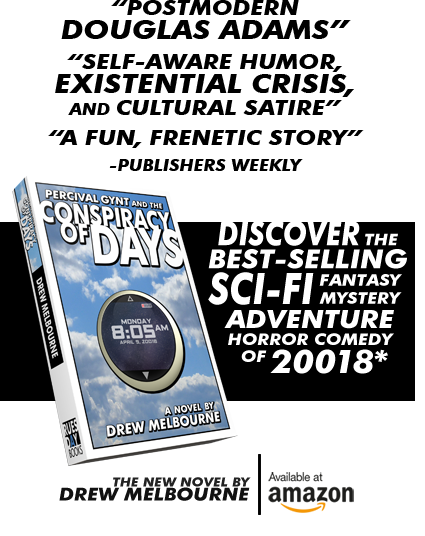The Fun Killers
There are two kinds of conflicts in fiction. (Which is to say that there are an infinity of conflicts, which I will now divide cleanly in two.)
In one, our hero triumphs by virtue of his/her awesomeness. This is fun for us, the reader or viewer, because awesomeness is awesome.
In the other, our hero is trying super hard to be awesome, but someone or something JUST. WON'T. LET. THEM. Booooo to that person, persons, or inanimate force. Why do they hate awesomeness? Why are they trying to kill our fun?
Today we're going to talk about the Fun Killers! What are they? What is their role in fiction? And how can understanding the Fun Killers make us better writers, better readers and viewers, and possibly less annoying on the internet?
Fun Killers kill a particular type of fun. The fun of watching the hero do what they do best. The giant slayer slays giants. The bank robber robs banks. The master detective detects... masters, I guess?
When the hero attempts to do what they're good at and is challenged, that's fun. The giant has two heads and breathes fire! The bank has extra lasers in that one hallway! The master is INVISBILE!
However when the hero is entirely prevented from doing what they're good at, that can be frustrating for the audience. The giant slayer can't get to the giant because a tree fell across the road. Now suddenly the story is mostly about whether he can drag a tree trunk twenty feet? Not fun. The bank robber promises his daughter he won't rob any more banks, and now he's working at Best Buy for half a season? Not fun. The master detective never even LOOKS for the master, because he's too busy solving murders? Oh. Wait, now I get that one.
One of the more infamous examples of a Fun Killer in recent years is the character of Skylar in Breaking Bad. For those who don't know the show, Breaking Bad is the story of Walter White, a high school chemistry teacher who decides to start a small business after he gets some bad news about his health. Skylar is Walter's wife. At first he lies to her about his side business and then when she finally finds out about it, she wants him to stop!
Now, it turns out that Walter is really good at... this thing he's doing. And the show is primarily about his business. So Skylar telling Walter not to... business... is like someone telling the giant slayer not to slay.
So not only is Skylar telling Walter to stop doing the exciting things that people are watching the show to see him do, we know she's doomed to failure because, per Netflix, there are still three more seasons after this.
If the show is only about the fun, only about vicariously watching the main character do their thing, whatever it is, the Fun Killer is always bad. It's wasting the audiences time and diluting the entertainment value of your work.
Note that there are a lot of things that can be fun in fiction that would be terrible if they actually happened to you. Think Godzilla stomping Tokyo. By and large, Godzilla movies don't care about the grim consequences of Tokyo stomping. If Godzilla's wife was all, "Maybe you shouldn't stomp Tokyo," that would be weird on many levels. (Who would marry Godzilla? Did she not know about the Tokyo stomping before they got married? Is she a giant monster that talks or a human woman who's just super into monsters?) And all of this is OK. Sometimes it's okay to say "This would be horrible if it's real, but it's not real, so I'm going to enjoy it like a roller coaster."
But Breaking Bad doesn't do that. Breaking Bad offers up Skylar-the-Fun-Killer as part of a larger examination of... Walter's business. Sure, viewers CAN watch the show as only entertainment, as if it were simply Entourage + crystal m--I mean, Entourage + paperwork and stuff, and for those viewers, Skylar's character will always be infuriating. But those viewers are missing the point and/or are deeply misogynistic, and also screw those guys.
That's Breaking Bad, where the Fun Killer is there to introduce an alternative point of view. There are other ways to employ Fun Killers. As we've already established, Fun Killers are frustrating. So what if your goal is to deliberately frustrate your audience?
This happens all the time in romantic comedies and soap operas. As soon as you introduce two attractive, likable leads, the audience is going to want them to get together. The writers job is then to keep them apart for as long as humanly possible. (In the case of a movie, that may be as little as 90 minutes. For a soap opera, that might be decades!)
In this formulation, "fun" is "living happily ever after" (or maybe just "doin' it") and the Fun Killers are all the obstacles that keep them apart. That might mean other suitors or disapproving parents or an inconvenient case of amnesia. The challenge is to make the Fun Killers fun diversions in their own right, but not so fun that the audience no longer wants your original couple to get together.
If Billy hits his head and forgets all about his fiance Kendra, and then starts dating Courtney, you don't want that storyline to be so excruciating that viewers tune out, but you also don't want the viewers to enjoy the Courtney storyline so much that they don't care about Billy getting his memory (and Kendra!) back.
(The quick solve for this is to make your Courtney too-good-to-be-true and then not-true. From Fun Killer to actual killer.)
The lesson here for the writer is tread carefully. Find the right balance. Complicate your viewpoints or your plots, but don't alienate your audience. Unless they're sexist jerks.
For audiences, understand why the Fun Killers exist. Don't freak out. Don't send death threats. It's a story. There are supposed to be ups and downs along the way. And if you feel like your being criticized for having fun when Godzilla stomps Tokyo...
...well, you probably are, you callous jerk. There were PEOPLE in those fake buildings! Real, tiny, fake people!


